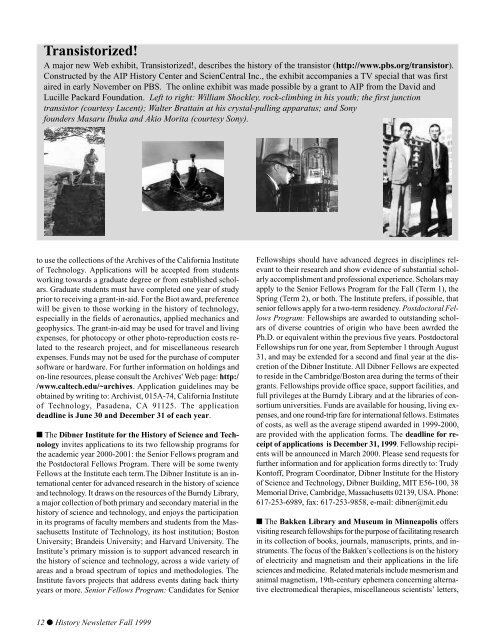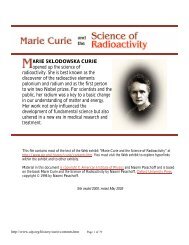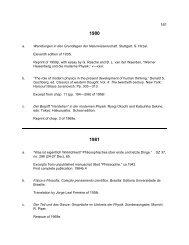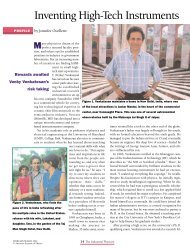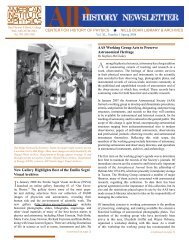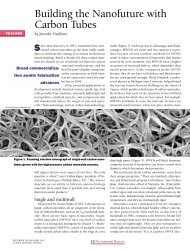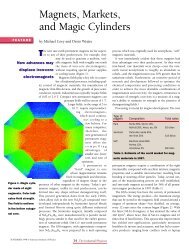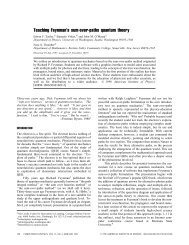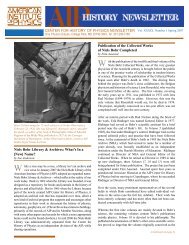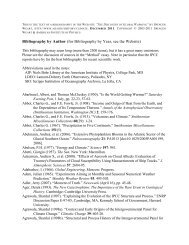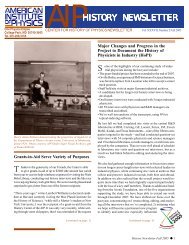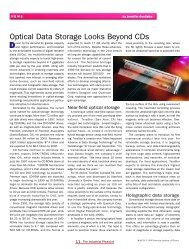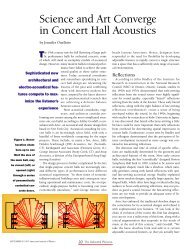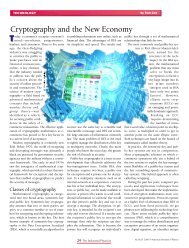Transistorized! - American Institute of Physics
Transistorized! - American Institute of Physics
Transistorized! - American Institute of Physics
Create successful ePaper yourself
Turn your PDF publications into a flip-book with our unique Google optimized e-Paper software.
<strong>Transistorized</strong>!<br />
A major new Web exhibit, <strong>Transistorized</strong>!, describes the history <strong>of</strong> the transistor (http://www.pbs.org/transistor).<br />
Constructed by the AIP History Center and ScienCentral Inc., the exhibit accompanies a TV special that was first<br />
aired in early November on PBS. The online exhibit was made possible by a grant to AIP from the David and<br />
Lucille Packard Foundation. Left to right: William Shockley, rock-climbing in his youth; the first junction<br />
transistor (courtesy Lucent); Walter Brattain at his crystal-pulling apparatus; and Sony<br />
founders Masaru Ibuka and Akio Morita (courtesy Sony).<br />
to use the collections <strong>of</strong> the Archives <strong>of</strong> the California <strong>Institute</strong><br />
<strong>of</strong> Technology. Applications will be accepted from students<br />
working towards a graduate degree or from established scholars.<br />
Graduate students must have completed one year <strong>of</strong> study<br />
prior to receiving a grant-in-aid. For the Biot award, preference<br />
will be given to those working in the history <strong>of</strong> technology,<br />
especially in the fields <strong>of</strong> aeronautics, applied mechanics and<br />
geophysics. The grant-in-aid may be used for travel and living<br />
expenses, for photocopy or other photo-reproduction costs related<br />
to the research project, and for miscellaneous research<br />
expenses. Funds may not be used for the purchase <strong>of</strong> computer<br />
s<strong>of</strong>tware or hardware. For further information on holdings and<br />
on-line resources, please consult the Archives' Web page: http:/<br />
/www.caltech.edu/~archives. Application guidelines may be<br />
obtained by writing to: Archivist, 015A-74, California <strong>Institute</strong><br />
<strong>of</strong> Technology, Pasadena, CA 91125. The application<br />
deadline is June 30 and December 31 <strong>of</strong> each year.<br />
■ The Dibner <strong>Institute</strong> for the History <strong>of</strong> Science and Technology<br />
invites applications to its two fellowship programs for<br />
the academic year 2000-2001: the Senior Fellows program and<br />
the Postdoctoral Fellows Program. There will be some twenty<br />
Fellows at the <strong>Institute</strong> each term.The Dibner <strong>Institute</strong> is an international<br />
center for advanced research in the history <strong>of</strong> science<br />
and technology. It draws on the resources <strong>of</strong> the Burndy Library,<br />
a major collection <strong>of</strong> both primary and secondary material in the<br />
history <strong>of</strong> science and technology, and enjoys the participation<br />
in its programs <strong>of</strong> faculty members and students from the Massachusetts<br />
<strong>Institute</strong> <strong>of</strong> Technology, its host institution; Boston<br />
University; Brandeis University; and Harvard University. The<br />
<strong>Institute</strong>’s primary mission is to support advanced research in<br />
the history <strong>of</strong> science and technology, across a wide variety <strong>of</strong><br />
areas and a broad spectrum <strong>of</strong> topics and methodologies. The<br />
<strong>Institute</strong> favors projects that address events dating back thirty<br />
years or more. Senior Fellows Program: Candidates for Senior<br />
12 ● History Newsletter Fall 1999<br />
Fellowships should have advanced degrees in disciplines relevant<br />
to their research and show evidence <strong>of</strong> substantial scholarly<br />
accomplishment and pr<strong>of</strong>essional experience. Scholars may<br />
apply to the Senior Fellows Program for the Fall (Term 1), the<br />
Spring (Term 2), or both. The <strong>Institute</strong> prefers, if possible, that<br />
senior fellows apply for a two-term residency. Postdoctoral Fellows<br />
Program: Fellowships are awarded to outstanding scholars<br />
<strong>of</strong> diverse countries <strong>of</strong> origin who have been awrded the<br />
Ph.D. or equivalent within the previous five years. Postdoctoral<br />
Fellowships run for one year, from September 1 through August<br />
31, and may be extended for a second and final year at the discretion<br />
<strong>of</strong> the Dibner <strong>Institute</strong>. All Dibner Fellows are expected<br />
to reside in the Cambridge/Boston area during the terms <strong>of</strong> their<br />
grants. Fellowships provide <strong>of</strong>fice space, support facilities, and<br />
full privileges at the Burndy Library and at the libraries <strong>of</strong> consortium<br />
universities. Funds are available for housing, living expenses,<br />
and one round-trip fare for international fellows. Estimates<br />
<strong>of</strong> costs, as well as the average stipend awarded in 1999-2000,<br />
are provided with the application forms. The deadline for receipt<br />
<strong>of</strong> applications is December 31, 1999. Fellowship recipients<br />
will be announced in March 2000. Please send requests for<br />
further information and for application forms directly to: Trudy<br />
Kont<strong>of</strong>f, Program Coordinator, Dibner <strong>Institute</strong> for the History<br />
<strong>of</strong> Science and Technology, Dibner Building, MIT E56-100, 38<br />
Memorial Drive, Cambridge, Massachusetts 02139, USA. Phone:<br />
617-253-6989, fax: 617-253-9858, e-mail: dibner@mit.edu<br />
■ The Bakken Library and Museum in Minneapolis <strong>of</strong>fers<br />
visiting research fellowships for the purpose <strong>of</strong> facilitating research<br />
in its collection <strong>of</strong> books, journals, manuscripts, prints, and instruments.<br />
The focus <strong>of</strong> the Bakken’s collections is on the history<br />
<strong>of</strong> electricity and magnetism and their applications in the life<br />
sciences and medicine. Related materials include mesmerism and<br />
animal magnetism, 19th-century ephemera concerning alternative<br />
electromedical therapies, miscellaneous scientists’ letters,


